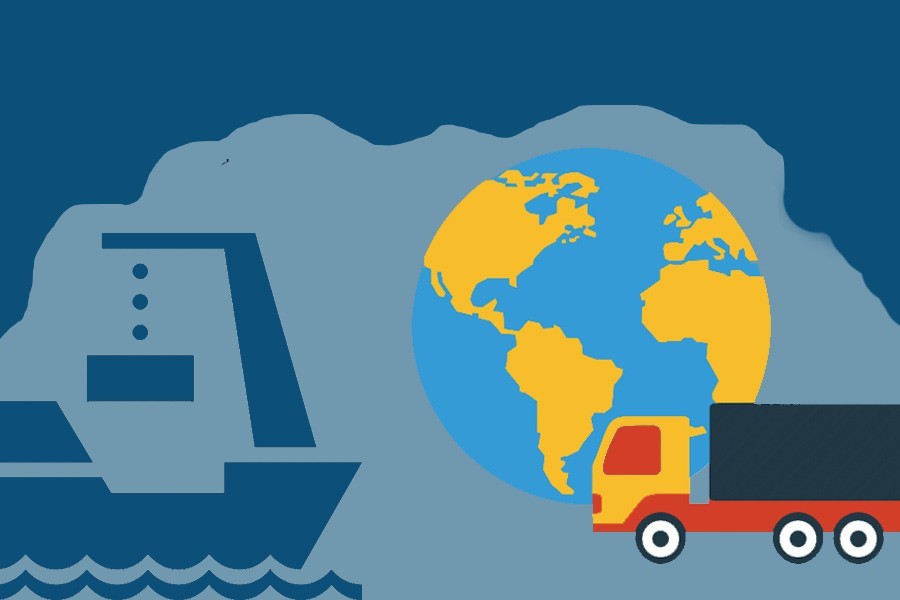The WTO member countries have shown restraint in imposing new trade-restrictive measures related to Covid-19 and continued to rollback the restrictions adopted earlier in the pandemic.
In a latest monitoring report, the World Trade Organisation (WTO) said the trade is set to recover most strongly in Asia while the less developed regions including Africa and the Middle East were lagging behind.
The findings of the WTO that deals with rules of trade between its 164 member nations came in an annual overview report of its Director-General, Ngozi Okonjo-Iweala, on the trade-related developments.
"Despite a slowdown in new trade restrictions unrelated to the pandemic, the stockpile of unrepeated restrictive measures that has accumulated since the monitoring exercise started in 2009 now affects traded merchandise worth an estimated US$ 1.5 trillion, or nearly 9.0 per cent of world imports," said the report.
It said the coverage of the ongoing Covid-19 trade-facilitating measures still in force was estimated at $ 112.1 billion while the coverage of trade-restrictive measures stood at $ 92.3 billion.

The report titled 'Trade Monitoring', which covered a period between mid-October 2020 and mid-October 2021, was presented to WTO members on December 9 last in a meeting of the WTO's Trade Policy Review Body (TPRB).
Talking to the FE, Md Hafizur Rahman, director general at the WTO Cell of the Ministry of Commerce (MoC), said Bangladesh faced no restrictive measures from the WTO members during the Covid-19 pandemic.
He, however, sought more time to go through details of the report prior to making any comment on it.
Former member of the Bangladesh Trade and Tariff Commission Dr Mustafa Abid Khan also said that neither Bangladesh nor other WTO members imposed any restrictive measures during the pandemic.
Replying to a question, he explained that India had not imposed Bangladesh-specific restrictions on export of Covid vaccines. It was rather a general restriction which was applicable for all countries, he added.
The WTO report noted that since the outbreak of the pandemic, 399 Covid-19 trade and trade-related measures in goods have been implemented by the WTO members and its observers as compared to the 335 measures reported in the last annual overview.
Of these latest measures, 262 (66 per cent) were of a trade-facilitating nature and 137 (34 per cent) could be considered restrictive.
Export restrictions accounted for 85 per cent of all restrictive measures recorded -- 117 measures in total -- of which 59 per cent had been repealed by mid-October 2021.
Despite the rollback, a total of 56 restrictions are still in place, of which 45 are export restrictions. Around 22 per cent of the trade-facilitating measures have also been terminated and 205 measures still in force.
In presenting the report to members, the WTO DG said that since the outbreak of the pandemic, the number of Covid-19 related trade-facilitating measures had outnumbered the restrictive ones by nearly two to one.
She noted that of the 117 export restrictions the members and observers introduced, 45 export restrictions remained in place, covering products such as medicines, other medical supplies and personal protective equipment.
"I urge members to rollback these restrictions as soon as possible as they may be hampering the Covid-19 response, including vaccine production and deployment," she said.
"The monitoring report makes clear that the multilateral trading system has been, and continues to be, an important factor in our response to the pandemic," the Director-General said.
"But we also know that trade and the WTO can and must do more to foster production of, and equitable access to, sufficient quantities of Covid-19 vaccines, diagnostics and therapeutics. This is why I have urged members to reach an agreement on pandemic response, including intellectual property issues, by the end of February."
During the period under review, only a limited number of new Covid-19 trade and trade-related measures were recorded for WTO members on goods, mainly consisting of extensions or terminations of measures introduced early in the pandemic.
Similarly, the flow of new Covid-19 related support measures by WTO members and observers to mitigate the pandemic's social and economic impacts decreased over the review period.
Services sectors were heavily impacted by the pandemic, and 138 (90 per cent) of the 153 reported Covid-19 related measures affecting trade in services put in place in response to the pandemic remain in force.
During the review period, 29 new Covid-19 related services measures were recorded by the WTO Secretariat.
With respect to non-Covid-19 related trade measures, 124 new trade-facilitating and 103 trade-restrictive measures on goods were recorded. The trade coverage of import-facilitating measures introduced during the review period was estimated at $ 481.6 billion and the coverage of import-restrictive measures stood at $ 105.9 billion.
Although the trade coverage of new import restrictions is relatively low, the stockpile of import restrictions implemented since 2009 and still in force was estimated at $ 1.5 trillion, representing some 8.7 per cent of world imports as of mid-October 2021.
According to the report, the volume of world merchandise trade is now expected to increase by 10.8 per cent in 2021, revised up from 8.0 per cent previously.
The trade growth should then slow to 4.7 per cent in 2022, revised up from 4.0 per cent, it said. These estimates assume global GDP growth at market exchange rates of 5.3 per cent in 2021 and 4.1 per cent in 2022.


